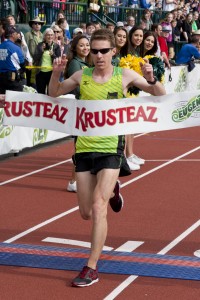Craig Leon wasn’t planning to run the Eugene Marathon.
“It wasn’t until about Thursday or Friday that I decided,” Leon said. “But it was nice weather, a good day. I was like, ‘Oh, I’ll hop in.’”
Leon got more than just a workout, as the 30-year-old marathoner from Team Run Eugene took advantage of a weaker field to win the event easily in 2 hours, 21 minutes, 32.04 seconds on Sunday morning.
Kota Reichert finished second in 2:26:51, and Yon Yilma finished third in 2:27:23.
Leon’s time was three minutes slower than the U.S. Olympic “B” qualifying standard, which Leon had surpassed at the Houston Marathon in January.
“It wasn’t necessarily about hitting a time,” Leon said. “It was about getting a nice, solid workout in.”
“I think he saw that this might be a great opportunity for more of a training effort,” Team Run Eugene coach Ian Dobson said. “To be able to go out and capitalize on what really was, unfortunately, a weaker field than what we had wanted.”
The Eugene Marathon proved to be a bit of a disappointment for Dobson, who is also the event’s elite athlete coordinator.
Only one runner in the entire event met the U.S. Marathon qualifying “B” standard. Catherine Watkins, who ran 2:42:35, which met the 2:43:00 grade. But Watkins is from British Columbia.
Her time wouldn’t qualify for consideration for the Canadian Olympic team, which set its standard for women’s marathons at 2:29:50.
Dobson was satisfied with the marathon’s turnout, which was up by 1,000 entries from the year before, but was disappointed with the performances turned in by the elite runners.
“It’s a mystery to me,” Dobson said. “I really expected to have a half dozen women qualify and to not get any, really, is a real surprise and disappointment, to be honest.”
Many factors could have influenced the poor performances. “As someone who works with the race, it’s my responsibility to figure out what went wrong,” Dobson said. “If it’s something we can control, we need to be able to fix it for next year.”
The course is relatively flat, and weather conditions were favorable Sunday for the race, which includes scenic paths through the University of Oregon, South Eugene, Autzen Stadium, the Willamette River and a finish on Hayward Field.
Another issue could have been the less-than-recognizable field of athletes.
While Leon was one of the handful of runners vying for a spot on the Olympic roster who participated in the Eugene Marathon, he is one of the only marathon runners who lives and trains in Eugene.
“I don’t think I would have run a race like this in any other place,” Leon said. “But because it’s here, you get to wake up and sleep in your own bed and come two miles down to the start line. It makes it a lot easier.”
Leon’s view of the convenience of the marathon is something Dobson hopes to capitalize on to improve future events.
“When we have local athletes at the top end of the races competing, I think that that trickles down,” Dobson said. “It sends a message to the rest of the community that says this is our community’s race. It’s not something where we just bring in a bunch of mercenaries to run this race.”
